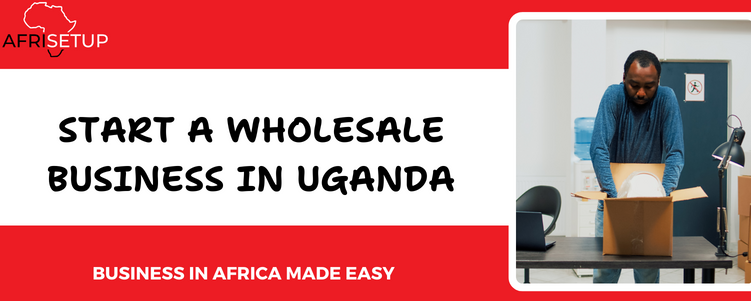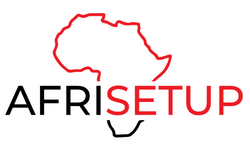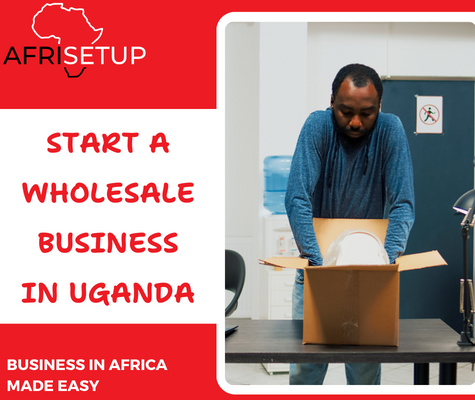- By afrisetupconsultants
- Uncategorized
- 0 Comment
Start a wholesale business in Uganda - Wholesale business in Uganda can be an exciting and rewarding venture for entrepreneurs looking to tap into the country’s growing economy and vibrant market. Whether you’re interested in supplying goods to retailers, manufacturers, or other businesses, establishing a wholesale operation requires careful planning, strategic decision-making, and a solid understanding of the local business landscape. In this comprehensive guide, we’ll walk you through the essential steps to start and grow a successful wholesale business in Uganda.
Looking to start a wholesale business in Uganda? Look no further! Afrisetup is here to assist you every step of the way. Whether you’re a local entrepreneur or a foreign investor, we provide comprehensive support to help you register a company in Uganda smoothly. With our expertise and guidance, navigating the process of setting up your wholesale venture in Uganda becomes hassle-free. From legal requirements to logistical support, we ensure that your business establishment journey is seamless and efficient. Contact us today!

How to start a wholesale business in Uganda
Starting a wholesale business in Uganda involves several steps to establish a successful operation. Below is a comprehensive guide to help you start a wholesale business in Uganda:
1. Market Research – Conduct thorough market research to identify potential opportunities, target markets, and demand for wholesale products in Uganda. Analyze consumer preferences, competitor offerings, pricing dynamics, and emerging trends.
2. Business Plan – Develop a detailed business plan outlining your wholesale business model, target market segments, product range, pricing strategy, marketing approach, operational processes, and financial projections.
3. Legal Requirements – Register your wholesale business as a legal entity with the Uganda Registration Services Bureau (URSB). Obtain all necessary permits, licenses, and registrations required to operate a wholesale business in Uganda.
4. Supplier and Product Selection – Identify reliable suppliers, manufacturers, wholesalers, or distributors offering quality products at competitive prices.
5. Online Platform Development – Create an e-commerce website or online marketplace to showcase your wholesale products, facilitate transactions, and connect with customers.
6. Inventory Management – Implement robust inventory management systems and processes to track stock levels, monitor product availability, and manage orders efficiently.
7. Marketing and Promotion – Develop a comprehensive marketing strategy to promote your wholesale business and attract retailers and businesses to your online platform.
8. Customer Service and Support – Provide excellent customer service and support to build trust, loyalty, and long-term relationships with retailers and businesses.
9. Logistics and Fulfillment – Establish efficient logistics and fulfillment processes to manage order processing, packaging, shipping, and delivery. Partner with reliable shipping and logistics providers to ensure timely and cost-effective transportation of goods to customers nationwide.
10. Continuous Improvement – Continuously monitor and evaluate the performance of your wholesale business, analyze sales data, customer feedback, and market trends to identify opportunities for improvement and growth.
N|B – By following these steps and investing time, effort, and resources into building your wholesale business in Uganda, you can establish a strong presence in the market, attract a loyal customer base, and achieve sustainable growth and success in the long run. Contact us today to start a wholesale business in Uganda as the comfort of your home.
What are the key factors to consider before I start a wholesale business in Uganda?
Starting a wholesale business in Uganda requires careful planning and consideration of several key factors to ensure success. Here are some important factors to consider:
1. Market Research – Conduct thorough market research to understand the demand for wholesale goods in Uganda. Identify potential market segments, customer preferences, and emerging trends.
2. Product Selection – Determine the product categories you intend to wholesale based on market demand, profitability, and your expertise. Consider offering a diverse range of products to cater to various customer needs and preferences.
3. Business Model – Define your wholesale business model, including pricing strategies, sales channels, and distribution methods. Decide whether you will operate as a general wholesaler offering a wide range of products or specialize in specific niches or industries.
4. Supplier Relationships – Establish strong relationships with reputable suppliers or manufacturers to ensure a steady supply of quality products.
5. Legal and Regulatory Compliance – Register your wholesale business with the relevant government authorities, such as the Uganda Registration Services Bureau (URSB) and Uganda Revenue Authority (URA).
6. Logistics and Warehousing – Set up efficient logistics and warehousing infrastructure to store and manage inventory. Choose a centralized location for your warehouse that allows for easy access to transportation networks and distribution hubs.
7. Online Presence – Leverage digital platforms and technology to establish an online presence for your wholesale business.
8. Customer Service – Prioritize excellent customer service to build trust and loyalty with your clients.
9. Financial Management – Develop a detailed business plan and financial projections to guide your wholesale business operations. Estimate startup costs, operating expenses, and revenue projections accurately.
10. Risk Management – Identify potential risks and challenges that may affect your wholesale business, such as supply chain disruptions, market volatility, or regulatory changes.
N|B – By carefully considering these key factors and developing a comprehensive business plan, you can lay the groundwork to start a wholesale business in Uganda. Contact Us today for help on the same
How much capital do I need to start a wholesale business in Uganda?
The capital requirements to start a wholesale business in Uganda can vary depending on factors such as the scale of operations, industry sector, and sourcing capabilities. Contact us today to get an accurate figure.
What are the most profitable wholesale business opportunities in Uganda?
In Uganda, several wholesale business opportunities have the potential to be profitable, depending on market demand, competition, and other factors. Here are some of the most promising wholesale business opportunities to consider before you start a wholesale business in Uganda:
1. Food and Beverage Products – Wholesale distribution of food and beverage products such as grains, pulses, cooking oil, spices, beverages, and snacks can be lucrative due to the consistent demand for these essential items.
2. Fast-Moving Consumer Goods – Wholesale distribution of fast-moving consumer goods, including toiletries, personal care products, household cleaning supplies, and cosmetics, presents opportunities for steady demand and repeat purchases.
3. Construction Materials – Wholesale distribution of construction materials such as cement, steel bars, roofing sheets, bricks, and hardware supplies is essential for Uganda’s booming construction industry.
4. Agricultural Inputs – Wholesale distribution of agricultural inputs such as seeds, fertilizers, pesticides, and farming equipment can capitalize on Uganda’s agrarian economy and the growing demand for modern farming techniques.
5. Electronics and Electrical Appliances – Wholesale distribution of electronics, electrical appliances, and consumer electronics presents opportunities in Uganda’s growing market for technology and household gadgets.
6. Textiles and Apparel – Wholesale distribution of textiles, clothing, and apparel products can cater to Uganda’s vibrant fashion industry and growing population.
7. Pharmaceuticals and Healthcare Products – Wholesale distribution of pharmaceuticals, medical supplies, and healthcare products is essential for Uganda’s healthcare sector. Partner with reputable pharmaceutical companies to supply a diverse range of medicines, medical devices, and healthcare essentials to pharmacies, hospitals, and clinics.
8. Automotive Parts and Accessories – Wholesale distribution of automotive parts, accessories, and lubricants can capitalize on Uganda’s growing automotive industry and the demand for vehicle maintenance and repair products.
9. Solar Energy Products – Wholesale distribution of solar energy products such as solar panels, batteries, inverters, and solar lighting solutions presents opportunities in Uganda’s renewable energy sector.
10. Beauty and Personal Care Products – Wholesale distribution of beauty and personal care products, including skincare, haircare, cosmetics, and beauty accessories, can tap into Uganda’s growing consumer market for grooming and self-care products.
What legal requirements do I need to fulfill to start a wholesale business in Uganda? Legal Requirements to run a wholesale business in Uganda
To start a wholesale business in Uganda, you must fulfill several legal requirements to operate legally and comply with regulations. Below are the key legal requirements you need to consider:
1. Business Registration – Register your wholesale business with the Uganda Registration Services Bureau (URSB) as a legal entity.
2. Tax Registration – Register your wholesale business for taxation purposes with the Uganda Revenue Authority (URA). Obtain a Tax Identification Number (TIN) and comply with tax obligations.
Remember, at Afrisetup, we offer a range of tax consultation services.
3. Trade License – Obtain a trade license or business permit from the local authority or municipal council where your wholesale business will operate.
4. Import and Export Permits – If your wholesale business involves importing or exporting goods, obtain the necessary permits and licenses from relevant government agencies, such as the Uganda Revenue Authority (URA) and Uganda National Bureau of Standards (UNBS).
5. Sector-Specific Regulations – Familiarize yourself with sector-specific regulations and licensing requirements applicable to wholesale businesses in Uganda.
6. Product Quality and Standards – Ensure compliance with product quality standards, labeling requirements, and regulatory specifications prescribed by the Uganda National Bureau of Standards (UNBS) for goods sold in the Ugandan market.
7. Employment Regulations – Comply with labor laws and regulations governing employment practices, including hiring, contracts, wages, benefits, health, safety, and termination of employees.
8. Environmental Compliance – If your wholesale business operations have potential environmental impacts, ensure compliance with environmental regulations and obtain any necessary permits or approvals from the National Environment Management.
9. Intellectual Property Protection – Safeguard intellectual property rights associated with your wholesale business, such as trademarks, patents, or copyrights, to protect against infringement or unauthorized use.
10. Record-Keeping and Reporting – Maintain accurate records of business transactions, financial statements, inventory, tax filings, and regulatory compliance documents.
NOTE: By fulfilling these legal requirements, you can establish a strong foundation to start a wholesale business in Uganda and mitigate the risk of legal issues or regulatory non-compliance.
What financing options are available for aspiring wholesale entrepreneurs in Uganda?
Aspiring wholesale entrepreneurs in Uganda have access to various financing options to fund their business ventures. Below are some financing options available for wholesale entrepreneurs in Uganda:
1. Commercial Banks and Financial Institutions – Traditional commercial banks and financial institutions offer business loans, lines of credit, and overdraft facilities to entrepreneurs seeking financing for their wholesale businesses.
2. Government-Supported Programs – Explore government-supported financing programs, grants, and subsidies available for small and medium enterprises in Uganda. Agencies such as the Uganda Development Bank, Uganda Investment Authority, and Uganda Development Corporation offer funding schemes, loan guarantees, and investment incentives to support entrepreneurial ventures.
3. Microfinance Institutions – Microfinance institutions provide small business loans, microloans, and financial services tailored to the needs of entrepreneurs and small-scale enterprises.
4. Venture Capital and Private Equity – Seek venture capital or private equity investment from investors, angel investors, or venture capital firms interested in financing promising business ventures in Uganda.
5. Trade Credit and Supplier Financing – Negotiate trade credit terms and supplier financing arrangements with manufacturers, wholesalers, or suppliers of goods.
7. Crowdfunding Platforms – Utilize crowdfunding platforms to raise capital from a large number of individuals or investors who contribute small amounts of money to support your wholesale business idea.
8. Export Credit and Trade Finance – Explore export credit and trade finance facilities provided by financial institutions to facilitate international trade transactions and export activities.
9. Grants and Donor Funding – Seek grants, subsidies, or donor funding from international development agencies, non-governmental organizations or philanthropic foundations supporting entrepreneurship and economic development initiatives in Uganda.
10. Savings and Personal Investment – Consider using personal savings, investments, or assets to finance your wholesale business startup costs.
N|B- When exploring financing options to start a wholesale business in Uganda, you should assess the terms, interest rates, repayment schedules, and eligibility criteria of each option carefully.
How can I expand my wholesale business in uganda beyond the local market?
Expanding a wholesale business in Uganda beyond the local market requires careful planning, strategic partnerships, and market entry strategies. Here are several steps you can take to expand your wholesale business beyond the local market:
1. Market Research and Analysis – Conduct thorough market research to identify potential export markets and international opportunities for your wholesale business.
2. Develop an Export Strategy – Develop a comprehensive export strategy outlining your goals, target markets, product positioning, pricing strategy, distribution channels, and marketing approach.
3. Compliance with International Standards – Ensure compliance with international standards, regulations, and quality requirements applicable to your products in target export markets.
4. Build Partnerships and Networks – Establish strategic partnerships and networks with international distributors, importers, wholesalers, retailers, trade associations, and industry contacts in target markets.
5. Online Presence and E-commerce – Leverage digital platforms, e-commerce websites, and online marketplaces to showcase your products and reach international customers.
6. Export Financing and Trade Support – Explore export financing options and trade support services offered by government agencies, financial institutions, and international organizations to facilitate your export activities.
7. Logistics and Supply Chain Management – Develop efficient logistics and supply chain management systems to handle international shipments, customs clearance, freight forwarding, and distribution logistics.
8. Customer Relationship Management – Build strong relationships with international customers and distributors by providing excellent customer service, personalized support, and responsive communication.
9. Market Expansion Pilot Projects – Consider conducting market expansion pilot projects or test runs in select target markets to assess market demand, customer feedback, and operational challenges before scaling up your export activities.
10. Continuous Learning and Adaptation – Stay informed about global market trends, economic developments, trade policies, and regulatory changes affecting your target export markets.
Expanding your wholesale business beyond the local market in Uganda requires persistence, innovation, and a strategic approach to internationalization. At Afrisetup, we are ready to help you start a wholesale business in Uganda and expand it beyond the local market with the assistance of our professional consultants.
How can I find reliable suppliers for my wholesale business in Uganda
Finding reliable Distributors/ suppliers for your wholesale business in Uganda requires diligent research, networking, and due diligence to identify reputable partners who can provide quality products consistently.
Here are several strategies to help you find reliable suppliers before you start a wholesale business in Uganda:
1. Trade Directories and Business Directories- Utilize trade directories, business directories, and online platforms that list suppliers and manufacturers in Uganda.
2. Trade Shows and Exhibitions – Attend trade shows, exhibitions, and industry events related to your wholesale business sector in Uganda.
3. Industry Associations and Trade Groups – Join industry associations, trade groups, and business networks relevant to your wholesale business sector in Uganda.
4. Online business to business Marketplaces – Explore online business-to-business marketplaces and sourcing platforms that connect buyers with suppliers globally.
5. Supplier Verification Services – Consider using supplier verification services or third-party sourcing agents to vet and verify potential suppliers in Uganda.
6. Referrals and Recommendations – Seek referrals and recommendations from industry contacts, business associates, and fellow entrepreneurs who have experience in sourcing products or working with suppliers in Uganda.
7. Online Research and Directories – Conduct online research using search engines, business directories, and supplier databases to identify potential suppliers in Uganda.
8. Trade Publications and Magazines – Subscribe to trade publications, magazines, and industry journals that cover your wholesale business sector in Uganda.
9. Factory Visits and Inspections – If feasible, consider conducting factory visits and inspections of potential suppliers’ facilities in Uganda. Direct visits allow you to assess production capabilities, quality control processes, and working conditions firsthand, providing valuable insights into supplier reliability and product quality.
10. Trial Orders and Samples – Before committing to large orders, consider placing trial orders or requesting product samples from potential suppliers in Uganda.
Conclusion
Starting a wholesale business in Uganda offers immense potential for aspiring entrepreneurs to tap into a thriving market and build a profitable enterprise. By following the steps outlined in this guide and staying committed to your vision, you can navigate the challenges and seize the opportunities that come your way. Take the first step towards realizing your wholesale dreams and embark on a journey of growth and prosperity. Start a wholesale business with our assistance. Contact us today!

